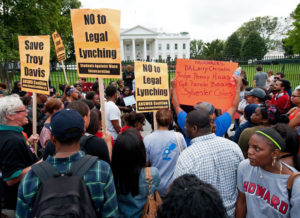
California voters will have a chance to strike a serious blow against the death penalty in the United States. Proposition 62 would abolish death row in the state. The ballot initiative has been endorsed by the Peace and Freedom Party—which nominated Gloria La Riva for President and Dennis Banks for Vice President.
With the passage of the proposition, all death row prisoners would have their sentences commuted to life in prison without the possibility of parole. While this sentence too would be considered extreme by global standards, a yes vote on Prop 62 would mark a major advance for the nationwide movement against the death penalty.
One out of every four inmates on death row in the United States, 746 out of 2,943, are in California.
Poor people who cannot afford an adequate legal defense are of course especially vulnerable to this horrible fate. The death penalty also functions as effectively the continuation of lynch law with the window dressing of legality.
An academic study of the application of the death penalty in California in the decade from 1990 to 1999 shows just how extreme this racism is. People who were convicted of killing a white person were four times more likely to be sentenced to death than someone who is convicted of killing a Latino person, and three times more likely to receive a death sentence that someone convicted of killing a Black person.
Twenty-eight percent of homicide victims in the state in the 1990s were white, but 80 percent of people executed in that decade were convicted of murdering a white person.
The threat of being railroaded by the court system into a death sentence, and there have been well over one hundred cases across the country of a prisoner on death row being later proven innocent, looms over all working class and oppressed communities.
It is such an important tool of terror that the ruling class of California is willing to pay dearly to keep it. Since 1978, the state government has spent $5 billion to execute 13 people—over $380 million per execution.
This is not simply a case of bureaucratic mismanagement—the ferocity with which state officials and molders of public opinion have defended the death penalty over the last few decades shows that there is a clear political will among the elite to maintain a “justice” system with the capacity to administer lethal force.
At the height of the wave of radical activism demanding justice, peace and liberation, the California Supreme Court ruled in the 1972 People v. Anderson case that the death penalty was unconstitutional. However, a right-wing counter-mobilization was able to quickly have capital punishment reinstated. Now, Proposition 62 gives voters the opportunity to reverse this defeat.
The death penalty is in many ways the most feared weapon in the arsenal of mass incarceration, an apparatus of social control that is indispensable to modern-day capitalism. A victory for Proposition 62 would be a victory for the growing movement against that system.





